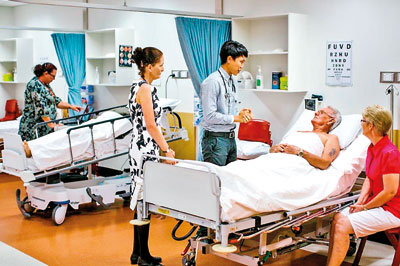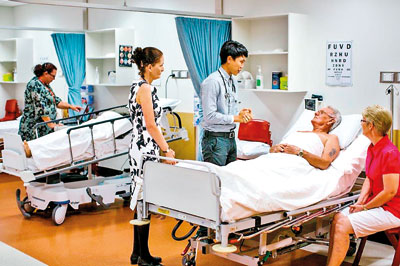Instill the awe of ‘Tropical Health of Medicine’ with Professor Ian Wronski
View(s):
JCU School of Medicine - Clinical Skills Ward
History books speak of heroes who achieved greatness, at the expense of others. Then there are those who wish to serve the masses without expecting praise nor honor, but the mere satisfaction of realization that their efforts made the impossible more practical.
Professor Ian Wronski is one such character who fits the description. As a seasoned veteran in the public health and medicine field, he had many personas throughout the illustrious career spanning over 40 year.
These personas made him play out different roles throughout his life; as a clinician, educator, health service planner and an agent in policy development. He was the first Director of Health Services in the Kimberley Aboriginal Medical Services Council and Medical Director of the Broome Regional Aboriginal Medical Service.
An autobiography of Professor Ian’s professional career cannot be summarized in a mere article, but for the sake of the readers, an illuminated snapshot; a highlight reel will be mentioned. Currently, the Professor is firmly established as the Deputy Vice Chancellor for the Division of Tropical Health and Medicine at James Cook University, Australia.
His ambition is fixated on the betterment of the next generation, by adding value to the already proficient human capital. He graciously granted the readers a visualization of his ideology.
What do you mean by the terminology “Tropical Health’?
The terminology ‘Tropical Health’ is used to describe the health of those residing in the tropics. It extends far beyond the traditionally defined ‘tropical medicine’ for epidemics like Malaria and Tuberculosis etc. Populations who live in the tropics often have diverse combinations of illnesses than those who reside in different environments. The environment acts as the catalyst for such reasoning.
In tropical countries, the spread of diabetes, cardiovascular diseases and cancer occurs simultaneously, as long as the infectious agents are still predominant. In the modern era, the health in the tropics is a combination of non-communicable disease and the remnants of infectious disease. This creates different health patterns.

Professor Wronski, Deputy Vice-Chancellor of the Division of Tropical Health and Medicine, James Cook University
What are the milestones passed by James Cook University, which you were glad to witness?
James Cook University excels in Life Sciences in every manner possible. It is rated the Number One in the world for Marine Biology. It remains competitively amongst the greats when it comes to Tropical Ecology. The same can be said for my field of specialization Tropical Health and Medicine. The University has remained rated between 80-105 in Life Sciences (Globally) for the past few years and for a medium-scale university like JCU to operate as such in a field which is as vast and competitive like Life Sciences is laudable. This is indeed a display of how far the university as come.
James Cook University is ranked 23rd in the Young University ratings. This rating is given amongst universities who are younger than the age limit of 50. The small scale and less experience is compensated adequately by the dedication and intellect of the students who attend the prestige university, which has earned it such ratings.
What are the proudest
moments of your life?
Memories are in abundance, especially considering my early career. Ranging from working with indigenous populations to building organizations to promote and facilitate health in remote areas of Australia, the experiences have indeed been exhilarating.. That led to my interest to serve rural remote health in an international level. This interest in tropical health paved the path for the invitation I received to be a part of the JCU family.
It has been an honor to build the health sector of JCU since 1992. I’m proud of the manner in which JCU has come together to build such a big, strong and interesting health sector in the university.
The fact that I am proud is precious in a more personal level. It is the fact that my own flesh and blood, my own son and daughter utilized the platform laid out by JCU to graduate with exceptional results. Both of my son and daughter graduated in Marine Biology and Medicine respectively.
How does JCU incorporate
these concepts to the
Sri Lankan audience?
James Cook University has been involved in the Sri Lankan market for a considerable period. Attempts to build a market was first made during the early 2000s; a period where the country was stricken with threats from the civil war, which was reaching its climax. This acted detrimental, but JCU was constantly on the lookout for favorable conditions to properly make its presence felt, because the specialist communities in Colombo encouraged the birth of a private medical school.
Given the context, it was impractical to visualize a favorable outcome. Once the dust of the war has settled, JCU revitalized the passion to properly enter the market. Thereafter, a strong relationship with Sri Lanka has been established.
I feel that there is a lot to share between the Sri Lankan community and Australia (JCU in particular). There is significant capacity in health force development and scientific research. James Cook University is set to undertake in clinical trials to test the effect of the Malaria vaccine in the upcoming year. This is only but one venture that is set in JCU’s agenda, and I believe such ventures has a lot to offer for the entire world at large.
Sri Lanka is beautiful not only due to its visual appeal. The availability of challenges further compliments the beauty, and that has been a crucial reason for the continuous interest invested by JCU. In Australia, these diseases were eradicated over 40 years ago therefore it is comfortable to work in Sri Lanka since the practices that are followed have proven to be effective.
What is the potential of the
Sri Lankan Youth? Can they
compete with students
in the international level?
The Sri Lankan youth should never undervalue their potential. The country has maintained a strong education system and actually takes education seriously. It is laid back in its approach, and that acts as an advantage. I’d be surprised if Sri Lanka doesn’t develop Economically and Socially during the next 10-20 years. That is why JCU feel that Sri Lanka is an ideal partner.
A factor which I used to judge a culture is the standards they set for education because I feel that those are the cultures which stands out. It is fitting to claim that Sri Lanka has a culture which stands out from the rest.
What are the specializations available in James Cook University?
There are a plethora of specializations which is difficult to mention in a single sitting. However, the Health Sector consists of Tropical Health and Medicine, Medicine, Dentistry, Veterinary Science, Physiotherapy, Nursing, Allied Health, Genetics and Molecular Biology.
The Australian Government has an assessment on research. In every area, JCU is rated above world standards. That is why the world feels that James Cook University has a lot to offer.
What are the success stories which prove JCU’s achievements?
James Cook University has produced students who have achieved greatness. One such student is currently a key figure in Amazon. A plethora of students went on to become successful researchers, clinical leaders in medical and nursing. Another past student (PhD graduate) has led projects for cancer treatment in remote areas.
What are the technologies
utilized in JCU?
A major hospital is established in the university premises which ensures clinical exposure for its students. The university is furnished with relevant modern equipment. The capacity of Genomics is significantly superior. The same can be told for Bio-technology, Biology. Underpinning the entirety, the strength of medical science is the presence of people who consistently attempt to ‘push the envelop’.
The Malaria vaccine is all set to go into clinical trials. Work and effort is exerted to develop Tuberculosis vaccines. Mathematicians are committed to model Tuberculosis outbreaks. The hospital is one of the most important medical facilities in North of Brisbane. This hospital has acquired CAT-scanners and all the other modern technologies.
What can be expected by the
academics passing out of JCU?
The researchers are humbled and that sends an important message to the next generations coming up and those who are yet to come. This delivers the message that you can become a superstar and still remain humble and do things which changes humanity. The younger generation who are hooked on social media and these other digital media platforms are mostly like empty vessels; they make noise but in reality the interior is hollow. The moderation that could be brought for these individuals who are in need of positive influence is invaluable.
What is the legacy which JCU
wishes to leave in Sri Lanka?
I wish to leave a mutually beneficial partnership which strengthens over time. The focus is to strategically plan what is to come throughout the next 50 years, and step by step the legacy shall be established. The goal is to develop intellects who are best equipped to serve the nation. Its a ripple effect, where a single person makes a continuous flow of differences. Collectively, JCU wishes to gift an output which make decisive changes to improve the quality of life within their motherland. Such is the legacy which JCU wishes to leave in its wake.
What is your promise to the
Sri Lankan society?
Promises are redundant, because they can be broken. JCU has ambitions, which has more value. We are determined to help make a difference, and if even a single Sri Lankan wishes to make a difference JCU is willing to lend a helping hand. It has to be voluntary, since it is not a epiphany which can be forcefully enforced.
If you produce an output of expert personalities who makes a difference for consecutive decades, the society will flourish with wise elderly citizens. These are the persons who instill and share the accumulated wisdom with the generations that are to take over the mantle. To ensure such a situation, we have to focus on the ominous present. My ambition is to utilize the influence given by JCU to make sure that such a vivid picture manifests itself in the prosperous future which the entire world deserves to witness.
For further queries and support, please email David Samuel, Regional Head, Email: david.samuel@jcu.edu.au and/or Gerald Joshua, Manager – Marketing (South Asia), Email: gerald.joshua@jcu.edu.au at James Cook University.
Randheer Mallawaarachchi


